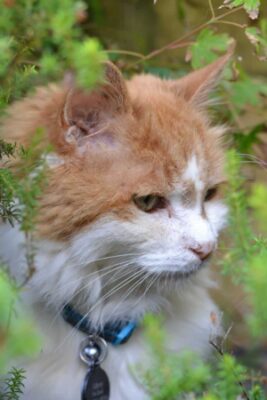My article in the Withernsea & District Community News
Poppy’s Pets
distributed to 9000 homes in East Yorkshire
You may notice subtle changes in your cat or dog as they age. Old age kicks in like humans; forgetfulness and clumsiness may show, and our pets are the same.
Statistics show that cognitive decline can affect 50% of dogs aged 11+ (slight changes may occur from age 8) and 68% in dogs aged 15+. In cats, the brain can begin to decline around 12 years old but typically from 15.
Cognitive Dysfunction Syndrome is also known as dementia. The condition is a degenerative brain disease with signs developing as your cat or dog’s brain ages. It causes gradual everyday behavioural changes, including the possibility of some aggression in dogs but only because they cannot tolerate rough and tumble with other pets or children anymore. Instead, the changes in the mind will confuse and frighten an animal.
Signs of dementia in cats:
- Subtle changes at first
- Toileting outside of the litter tray
- Forgetfulness (e.g. forgetting to eat or that they have eaten, where the food station, litter tray or cat flap is located)
- Confusion and disorientation
- Loud vocalisation (generally at night)
- Getting stuck in places and unable to free themselves
- Periods of depression and may periodically stop eating or taking any medication
- Change to sleep patterns (they may be awake at night time and sleep more during the day)
- Reduced interest in playing
- Getting lost in familiar places
- Inability to learn new things or respond to words
- Staring at walls
- Less active
Signs of dementia in dogs:
- General behavioural changes
- Pacing and circling
- Being withdrawn, anxiety and/or depression
- Aggression
- Inability to free themselves from corners or walk around an obstacle
- Reduced interest in playing (consider introducing puzzle games in old age to keep the brain active)
- Getting lost in familiar places
- Inability to learn new tricks or respond to any commands
- Staring into space
- Less active
- Eating less or more
- Memory loss

Our pets are living longer thanks to advancements in veterinary knowledge and the development of medicine. Some cats or dogs (or birds) may never develop dementia, but unfortunately, for those that do, the brain will deteriorate further over time. Sadly, there isn’t a cure, only management.
A complementary feed can help manage the early stages:
Both come in a pack of 60. Financially, RenewMe is the better option because it is a lot cheaper, and suitable for cats and dogs.
Aktivait is available for cats, small dogs, and medium to large dogs.
Related articles:

Even though your pet may seem less confused when taking Aktivait or RenewMe, never walk your dog off lead and keep your cat in a secure garden (catio or cat-fencing) for safety. Your pet will still rely on you to keep it safe.
Article published in the Withernsea & District Community News – October 2021
Disclaimer:
I am not a veterinary professional. If you have concerns about your pet, please allow your vet to perform an assessment and tests to rule out other causes.
Poppy’s Pets has a column in the Withernsea District & Community News.

